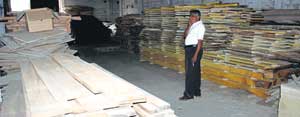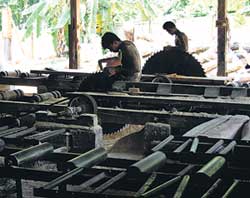
| Funeral bells for the rubber wood industry PADUKKA – The local rubber wood-based industry has been struggling for while now as its main raw material – timber - has been in short supply in recent years. The industry has been complaining about the short supply and many blame it on the presence of the Merbok MDF plant in the Horana Industrial Zone.
The BOI-approved Malaysian-run factory uses rubber wood as its main raw material to produce MDF boards out of which 90% is exported, and acquires most of the resources that were earlier available to local firms sending up prices sharply. However this is considered as a low value added product compared to the other wood based products such as brush handles and furniture exported by the local producers. The most affected are the small and medium scale wood-based manufacturers who find it extremely difficult to compete with the increasing price of rubber logs. “Hundreds of saw mills have closed. Many workers have lost their livelihood. The wood based export industry which encompasses both coir and rubber wood, a key export industry, is badly affected so much so that they are forced to import rubber wood to fulfill commitments to buyers,” Lakshman Thilakaratne, Secretary of the Wood-based Industrialists Association explained to The Sunday Times FT. Industry officials say the price of one cubic metre of rubber wood has increased drastically in the past few years. In the 1990s a cubic foot was Rs.70 but by 2001 it rose to Rs.80 and today has more than doubled that rate at Rs.180.
Officials say about 500 small industries manufacturing products such as brush blocks, wooden toys, pallets, furniture and other similar products both for the local and export market and about 150 saw mills have all closed down as a result. At Padukka, Gallage Premaratne, factory manager of Gamage Saw Mills, a small scale wood based producer of brush handles for export, said about 75% of the saw mills in the area have shut down. The small saw mill owners are very badly affected. Subcontractors who supply logs have also gone out of business and the labourers who were working for them don’t have jobs anymore. The saw mills don’t have enough material to work everyday or at full capacity when the machines are running. Most often the mills work at half their capacity for about two or three days at a time depending on the availability of the material. The mills which used to churn out wood with such an uproar are now sleeping giants lying undisturbed on the soft comfort of wood dust. Even the workshop tables are all clean and tidy, a rather unusual sight at any wood workshop. The few employees that remain at the workshops either idle about or are kept busy oiling and cleaning machines. Some of the saw mill owners are running the mills at a loss as they have no other option but to do so to keep their earlier commitments to buyers or because they cannot lay off the workers over night. “We have about 80 workers in the factory we haven’t fired anyone as yet, but we are not sure of what’s going to happen next year. We have orders we have taken from foreign buyers but we don’t have the raw material to produce the goods so we are in a fix. We spend about Rs 800,000 rupees to pay wages and as fixed costs every month. We work only one or two days a week, when employees come we cannot ask them to leave, we have to employ them,” said Premaratne speaking about the dilemma of the business.
The situation is not the same everywhere. At Waruna Exports the company was compelled to lay off about 50 workers. “The cost is too much, we can’t compete with the world market,” said Rajitha Fernando, General Manager of Waruna Exporters (Pvt) Ltd, which manufactures and export industrial and household brushes, brooms and blocks. Several weeks ago, The Sunday Times FT reported on the extra ordinary concessions given to Merbok by the BOI when it was first launched. The company has obtained a stay order from the District Court against the BOI’s decision to terminate basic services to the factory because Merbok has failed to settle the dues owed to the BOI for services provided. Some of the saw mill owners at Waskaduwa, a small town between Panadura and Kalutara, have different reasons for not giving up the loss making the business. Waskaduwa is reputed for its many saw mills which specializes in rubber wood based products. Many of the saw mills in the town have come down from father to son. One such businessman, A. Ravindra Priyantha who used to run a saw mill which was handed down to him by his father told The Sunday Times FT that his mill is inactive most of the month as he cannot buy the logs at a price as high as 180 rupees (the price paid by Merbok). “Some people do this while incurring losses because they don’t tell people not to come to work. So they pay salaries out of their own pockets. They are reluctant to close down the mills because the businesses have been handed down from father to son and they didn’t venture out into different fields and now they are lost because the income has stopped,” said Priyantha standing in his inactive workshop which once used to buzz with activity not only during the day time but many a night before the current crisis. Of the 30-odd mills that used to run about three to four years back, many remain closed.
“About 15 of them are closed because they cannot get the fire wood and they are struggling to get into some other business as their main source of income has been lost,” said Sarathweera De Silva, Treasurer of the Rubber Plantation Protection Society and Managing Director, Somachandra Saw Mills. The industry is not only finding it difficult to obtain raw material but also in retaining orders as the cost of raw material is making it extremely hard to maintain competitive prices with suppliers from other countries. “We take orders from Japan, Belgium, and France but we cannot sell our products if we pay more than Rs 180 per cubic metre. We cannot sell our brush handles for more than even US$2 and we have to bargain so much as buyers can get cheaper products from China or Malaysia,” said Premaratne. Looking around hopelessly at a mill that is working below capacity, Chandrasiri Gamage, Managing Director of Gamage Saw Mills, says there are few options left. “If this continues to happen we might have to go into the forests and cut trees just to survive.” |
| || Front
Page | News
| Editorial
| Columns
| Sports
| Plus
| Financial
Times | International
| Mirror
| TV
Times | Funday
Times | |
| |
Copyright
2006 Wijeya
Newspapers Ltd.Colombo. Sri Lanka. |



